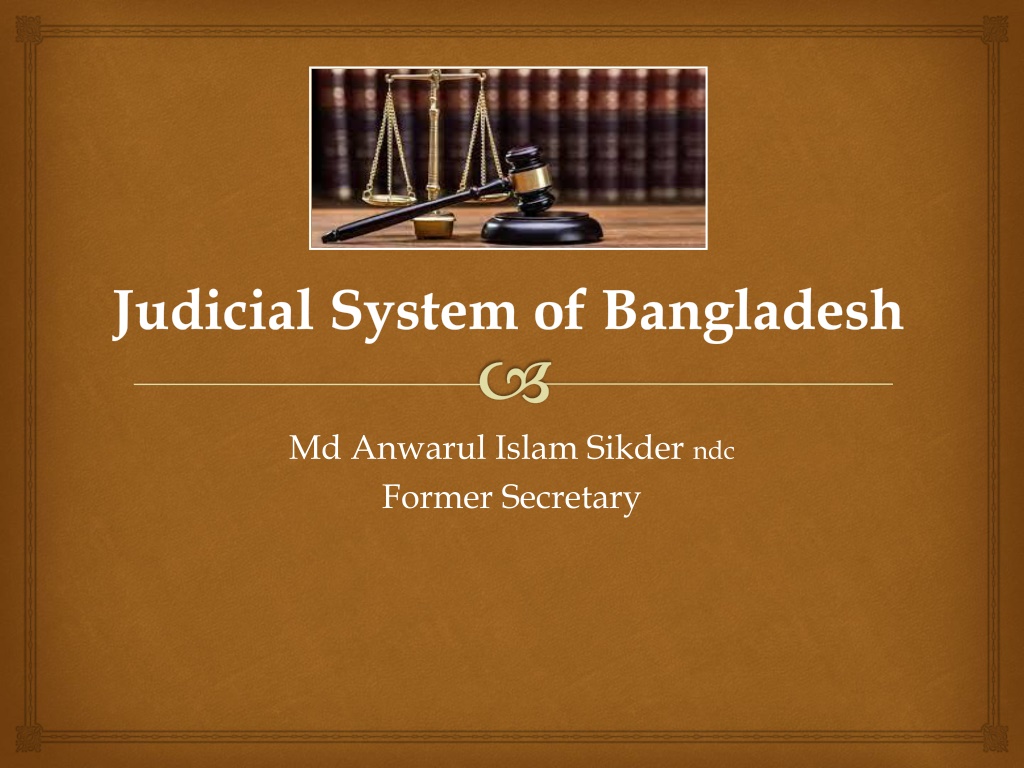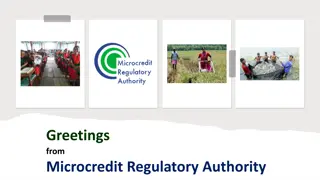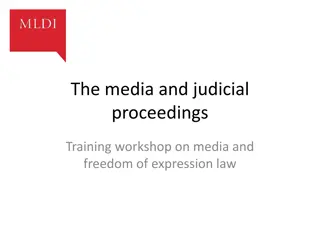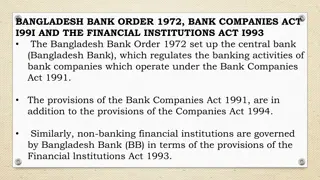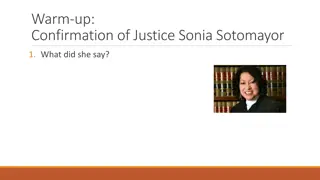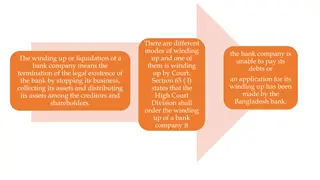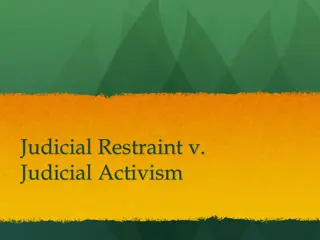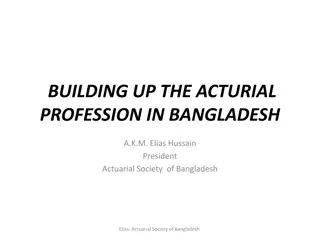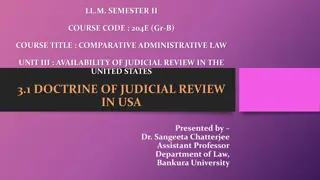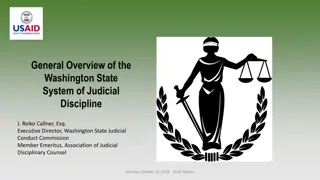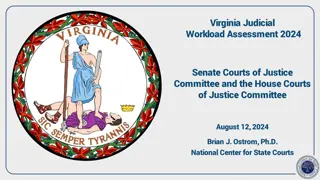Understanding the Judicial System of Bangladesh
The judicial system of Bangladesh is diverse, consisting of the Supreme Court, civil and criminal courts, courts of special jurisdiction, and more. The Constitution plays a vital role, outlining the structure and functions of the courts. From the Supreme Court to subordinate courts and tribunals, the legal framework follows a structured hierarchy. This informative content provides insights into the courts in Bangladesh and their roles in dispensing justice.
Download Presentation

Please find below an Image/Link to download the presentation.
The content on the website is provided AS IS for your information and personal use only. It may not be sold, licensed, or shared on other websites without obtaining consent from the author. Download presentation by click this link. If you encounter any issues during the download, it is possible that the publisher has removed the file from their server.
E N D
Presentation Transcript
Judicial System of Bangladesh Md Anwarul Islam Sikder ndc Former Secretary
Session Plan Minute Sl 1 Courts in Bangladesh 2 The Supreme Court of Bangladesh 3 Civil & Criminal Courts 4 Court of Session & Court of Magistrates 5 Courts/Tribunals of special jurisdiction 6 Good to know: Some issues 7 Q & A Total Items 05 10 20 15 10 20 10 90
Bangladesh Constitution Constitution: The basic source of law Part VI: Article 94-113: The Supreme Court Articles 114-116A: Subordinate Court Article 117: The Administrative Tribunal
Courts in Bangladesh Can be discussed under 3 main heads: The Supreme Court of Bangladesh Courts of Sessions and District Judges Courts (Subordinate Courts) Tribunals and Special Courts (Constitutes under Special Laws)
Courts in Bangladesh The Supreme Court of Bangladesh Appellate Division & High Court Division Subordinate Courts Court of District Judge Court of Additional District Judge Court of Joint District Judge Court of Senior Assistant Judge Court of Assistant Judge Court of Session Judge Court of Additional Session Judge Court of Joint District Judge
Courts in Bangladesh Court of Chief Metropolitan Magistrate Court of Addl. Chief Metropolitan Magistrate Courts of Other Metropolitan Magistrate Court of Chief Judicial Magistrate Court of Addl. Chief Judicial Magistrate ) Court of Judicial Magistrate Courts of the First Class, Second Class & Third Class Magistrate
A.The Supreme Court Article 94(1): Supreme Court of Bangladesh comprising two divisions the AD and the HCD. The Supreme Court shall consists of the Chief Justice of Bangladesh and such number of other Judges as the President may deem to necessary to appoint to each division. Article 94(2)
The Appellate Division: Jurisdiction The AD has jurisdiction to hear and determine appeals against judgments decrees, orders or sentences passed by the HCD (Article 103(1)). It has also an advisory jurisdiction.
The HCD: Jurisdictions The HCD has special and statutory original, revisional, admiralty, appellate and other jurisdictions (Article 101). Under special original jurisdiction, it is authorized to enforce fundamental rights of the citizens and to issue certain orders and directions in the nature of writs of prohibition, mandamus, certiorari, habeas corpus and quo-warranto (Article 102).
Jurisdiction of the AD No original jurisdiction. The sources are: A.The Constitution; and B. Ordinary law. A. The Constitution: a. Appellate jurisdiction; b. Jurisdiction as to issue and execution of process; c. Jurisdiction as to review; and d. Advisory jurisdiction.
a. Appellate jurisdiction The appellate jurisdiction applies only against the judgment, decree, order or sentence of the HCD Two magnitudes: 1. appeal lies as of right; in following three cases: Where HCD certifies that the cases involves a substantial questions of law as to interpretation of constitution;
a. Appellate jurisdiction Where the HCD sentences a person to death or imprisonment for life; and Where HCD punishes a person for its contempt. 2. Appeal can be made if the AD grants leave to appeal.
Jurisdiction of HCD Supervisory power over subordinate court/ tribunal : Want or excess of jurisdiction; Failure to exercise jurisdiction; Violation of procedure or disregard of principles of natural justice; and Findings based or no materials, or order resulting in manifest injustice.
B. Subordinate/Lower Courts Two broad categories namely: Civil and Criminal Courts. Separated in 1st Nov 2007 However, Mobile Court Act 2009 has given some judicial powers to the Executive Magistrates.
Civil court Created under the Civil Courts Act of 1887. Five tiers of civil courts in a district: 1. Court of District Judge. 2. Court of Additional District Judge. 3. Court of Joint District Judge. 4. Court of Senior Assistant Judge. 5. Court of Assistant Judge. The first two are generally courts of appeal in civil matters,
Civil court 1. Court of the District Judge. Mainly an appellate court, limited original jurisdiction. District Judge hears and determines appeals against Joint District Judges judgments, decree or orders The District Judge s pecuniary jurisdiction is unlimited and he has power to delegate his function or transfer appeal to the Additional District Judge or any other civil court
Civil court 2. Court of Additional District Judge. Similar to the District Judges except that they cannot receive appeals from any inferior courts 3. Court of Joint District Judge. The Court of Joint District Judge exercises both original and appellate jurisdiction. All cases, which exceed the pecuniary jurisdiction of Senior Assistant Judge, are filed in the Court of the Joint District Judge. The jurisdiction of the Court of Joint District Judge extends to all original suits without any pecuniary limit.
Civil court 4. Court of Senior Assistant Judge. The Court of Senior Assistant Judge has original jurisdiction and appeal from this court lies to the Court of the District Judge. Moreover, the Court of Senior Assistant Judge acts as the Family Court and also acts as the Election Tribunal 5. Court of Assistant Judge All civil suits are filed in the Court of Assistant Judge
Criminal Courts The Code of Criminal Procedure 1898. Two classes of Criminal Courts a. Courts of Sessions b. Courts of Magistrates The subordinate criminal courts Courts of Session Judge. Court of Additional Session Judge. Court of Joint Session Judge. Court of Chief Metropolitan Magistrates (CMM). Court of Additional CMM. Court of Magistrates of the First Class. Court of Magistrates of the Second Class. Court of Magistrate of the Third Class.
A. Courts of Session Three tiers of judges, namely, Sessions Judge, Additional Sessions Judge and Joint Sessions Judge. Sessions Judge and Additional Sessions Judge hold same powers, while Joint Sessions Judge enjoy lesser powers. A Sessions Judge and an Additional Sessions Judge may impose any penalty including the death penalty prescribed by law
Courts of Session The Court of Session for a metropolitan area is known as the Metropolitan Court of Session. All Joint Session Judge shall be subordinate to the Sessions Judge in whose Court they exercise jurisdiction and all Judicial Magistrates including to the Chief Judicial Magistrates shall be subordinate to the Metropolitan Session Judge
B. Court of Magistrates Section 6(2) of CrPC: 2 types of magistrate court: Judicial and Executive Magistrates Four types of Magistrates: CMM in metropolitan areas and Chief Judicial Magistrate in other areas, Magistrates of the first class, Magistrates of the second class and Magistrates of the third class.
Executive Magistrate Section 10 of CrPc 1898 In every district and in every metropolitan area: The District Magistrate Additional District Magistrate, with all or any of the powers of a DM. All Assistant Commissioners, ADCs or UNOs in any district or Upazila shall be Executive Magistrate.
Village Court Composition: Chairman and 4 members, consisting two members from both sides. From each side one member be member of Union Parishad and one member be a woman. Power of VC: up to BDT 75,000 Revisional Court: Assistant Judge Appelate Court: Schedule 1: Magistrate 1st Class, Sch. 2: Asst Judge
Courts &Tribunals of special jurisdiction Both civil and criminal, established by law and constitutional provisions In civil area Labour Courts Family Courts, Money Loan Courts, Bankruptcy Courts, Income Tax Tribunals, Administrative Tribunals, Election Tribunals, etc.
Courts &Tribunals of special jurisdiction In criminal area Special Tribunals, Public Safety Tribunals, Tribunals Against Repression of Women & Children, . Village Courts. Artho Reen Adalat etc All Session Judges, Addl Session Judges or Asst Session Judges act as judges of Special Tribunals
Courts &Tribunals of special jurisdiction Court of Special Judge. The Special Judges may be appointed from among Sessions Judges, Metropolitan Magistrates or Magistrates of the first class.
Administrative/Admn. Appellate Tribunal. Administrative Appellate Tribunals: one chairman and two other members. The Chairman: is, or has been, or is qualified to be a Judge of the Supreme Court, Two members: is or has been an officer not below the rank of joint Secretary and the other: is or has been a District Judge. Labour Courts The chairman is appointed from amongst the district judges or additional district judges and one of the members is appointed in consultation with the employers and the other in consultation with the workmen.
Court of Settlement Chairman : persons who are or have been or are qualified to be a judge or additional judge of the Supreme Court. One are or have been judicial officers not below the rank of additional district judge and the other are or have been officers not below the rank of a deputy secretary.
Arbitration and Arbitration Appellate Tribunal Any person aggrieved by an order of assessment of compensation of requisition or acquire any land or building may file an application to the Arbitrator appointed by the government from amongst persons holding post not below the rank of the joint district judge. An appeal lies to the Arbitration Appellate Tribunal constituted with a member appointed from amongst persons who are or have been district judges against the award of the Arbitrator.
Other courts Election Tribunals Vested Roperty Return Tribunal and Appellate Tribunal Land Survey Tribunal and Appellate Tribunal
Good to know Criminal & Civil law The CrPc 1898 (565) The CPC 1908 (511) The Penal Code 1860 The Evidence Act 1872 The PRB 1943 (1290) CrPC Section 54 Section 107 Section 144 Section 161 Section 164
Good to know Affidavit Bail Bail Bond PRB 15 Burden of proof Estoppel Warrant and Summoned
Good to know Personal experience Indemnity to Judges Mens Rea Preference to acquittal Prima facie
Lets Identify 1 2 3 4 5 6
